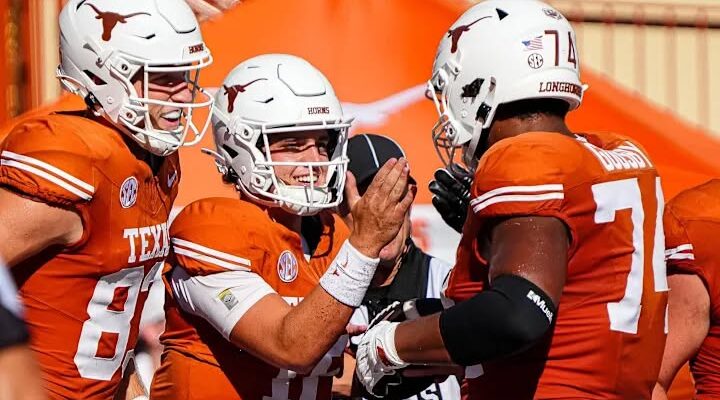Texas Longhorns Boast Talent and Depth, But One Lingering Issue Could Undermine Their 2025 College Football Playoff Hopes.
The Texas Longhorns enter the 2025 college football season with high expectations, armed with a roster that blends elite talent, veteran leadership, and fresh five-star recruits. Head coach Steve Sarkisian has finally built the kind of depth and culture that once defined Texas during its glory years, and many analysts believe this team is more than capable of reaching the College Football Playoff. However, beneath the surface of confidence and optimism lies one nagging issue that could undermine the entire operation—a question mark that, if not resolved, could derail a championship run before it ever begins: the quarterback position.
On paper, Texas appears loaded at nearly every spot. The offensive line is seasoned, physically imposing, and deeper than it has been in a decade. The wide receiver corps includes future NFL prospects who can stretch the field and dominate in contested catch situations. The running back room boasts multiple capable backs who bring versatility to Sarkisian’s offense. Defensively, the Longhorns return several key contributors, and their recruiting hauls over the last three seasons have significantly upgraded both the front seven and the secondary. From top to bottom, this is a roster built for success. But none of that will matter if Texas doesn’t get consistent, high-level play at the most important position in the sport.
The post-Quinn Ewers era has officially begun in Austin, and that transition brings both excitement and uncertainty. Ewers, who had his ups and downs during his Texas career, ultimately matured into a dependable starter who led the Longhorns to their first College Football Playoff appearance. His departure to the NFL opens the door for a new signal-caller, but the competition to fill that role has yet to yield a definitive answer. The battle has centered around redshirt freshman Arch Manning and sophomore Maalik Murphy, both of whom bring different skill sets to the table but lack meaningful game experience.
Arch Manning, the name that has echoed through college football circles since his high school days, comes with a legendary pedigree and tremendous expectations. As the grandson of Archie Manning and nephew of Peyton and Eli, Arch has been under the microscope since he first picked up a football. His recruitment was a spectacle, and his decision to choose Texas was viewed as a monumental win for Sarkisian. But expectations and potential don’t always translate into immediate production. Despite spending a year learning Sarkisian’s system and working behind the scenes, Manning has yet to prove that he can handle the pressure of being the face of Texas football in the SEC era. His talent is undeniable—he has the arm, the intelligence, and the poise—but it remains to be seen whether he can rise to the moment when the stakes are highest.
Maalik Murphy presents a different kind of intrigue. At 6-foot-5 and 240 pounds, he looks the part of a modern college quarterback with a cannon for an arm and the ability to extend plays. In limited action, he’s shown flashes of brilliance, including during Texas’ spring game where he demonstrated improved decision-making and command of the offense. Coaches have praised his work ethic and development, and many inside the program believe he could be the answer. Yet, the lack of real game reps remains a concern. Can Murphy maintain consistency through the grind of a full SEC schedule? Can he protect the football in hostile environments? Can he deliver in high-leverage situations with playoff hopes hanging in the balance?
Sarkisian’s reputation as a quarterback guru only adds to the pressure of making the right choice. Known for developing talents like Tua Tagovailoa, Mac Jones, and Matt Leinart, Sarkisian now faces one of the most critical personnel decisions of his career. The timing couldn’t be more sensitive, either. Texas is no longer operating in the relatively comfortable confines of the Big 12. They’re now in the SEC, where every week feels like a playoff elimination game and where quarterback play often determines who gets to Atlanta and who’s watching from home.
Adding another layer of complexity is the possibility of a rotating quarterback situation early in the season, especially if neither Manning nor Murphy clearly separates themselves during fall camp. While competition can be healthy, indecision at quarterback rarely yields positive outcomes. Continuity, chemistry, and leadership often suffer when a team doesn’t know who its quarterback is from week to week. Wide receivers need to build timing with one guy. Offensive linemen need to understand cadence and rhythm. And, perhaps most critically, the locker room needs a clear leader to rally behind.
If Sarkisian doesn’t solidify the quarterback situation quickly, he risks creating a scenario where the offense struggles to find its identity. That’s a dangerous proposition in a league where opposing defenses are fast, physical, and opportunistic. The early part of Texas’ schedule isn’t forgiving, either. A neutral site matchup with Michigan in Week 2 will be a playoff-caliber environment, and games against Georgia, LSU, and Texas A\&M loom large in the second half of the season. There won’t be much time to experiment or adjust.
Moreover, the impact of poor quarterback play extends beyond the scoreboard. It affects confidence, momentum, and morale. A slow start could cause unrest among fans and media, ramping up pressure on Sarkisian and his staff. The last thing Texas needs is a repeat of the quarterback carousel that haunted the program in the years before Ewers’ arrival. Those seasons were marked by inconsistent offensive production, squandered talent, and missed opportunities—precisely the kind of regression that could derail this year’s championship ambitions.
It’s worth noting that even elite teams have fallen short because of quarterback uncertainty. Just look at programs like Georgia prior to their national title breakthrough, or LSU before Joe Burrow transformed the offense. Talent across the roster can mask weaknesses for a time, but eventually, the spotlight finds the quarterback. In the SEC, especially with the expanded playoff format in 2025, teams will need not just competence at the position—they’ll need greatness. The Longhorns have to know who that player is, and they have to know it soon.
Recruiting success also hangs in the balance. Five-star wide receivers and top-tier offensive linemen want to play in systems where the quarterback situation is secure. Prospects are watching closely. Another year of quarterback drama could shake confidence in the program’s ability to develop the position. Sarkisian has done a masterful job of rebranding Texas as a destination school again, but that momentum can evaporate quickly if the offense underperforms because of instability under center.
Still, there’s reason for hope. Both Manning and Murphy are talented enough to seize the job and thrive. The infrastructure around them is solid, the coaching is proven, and the schedule—while brutal—offers enough marquee moments for one of them to become a star. If either quarterback steps up and commands the huddle, the Longhorns have a legitimate shot at not just making the playoff, but competing for a national championship.
The scenario is reminiscent of other elite programs that have navigated similar crossroads. Alabama in the early 2010s routinely found ways to win even when its quarterback play was average. But when it leveled up at the position, the Crimson Tide became nearly unbeatable. Texas is at a similar inflection point. The floor is high because of the talent on the roster, but the ceiling is entirely dependent on who emerges as the leader of the offense.
As fall camp approaches, all eyes will be on Sarkisian’s decision. Will he go with the prodigy carrying the weight of a legendary surname, or will he trust the big-armed sophomore who has steadily climbed the depth chart? More importantly, will one of them rise above the noise and become the kind of difference-maker who can deliver Texas back to national prominence?
The margin for error is razor-thin in the SEC, and the playoff committee will be watching every game, every quarter, every drive. For the Longhorns, the pieces are all in place for a historic season. But if the quarterback question isn’t answered definitively—and soon—it may be the one concern that turns promise into heartbreak. Talent and depth will take them far, but without stability and excellence at quarterback, Texas’ 2025 playoff dreams could end before they ever truly begin.


